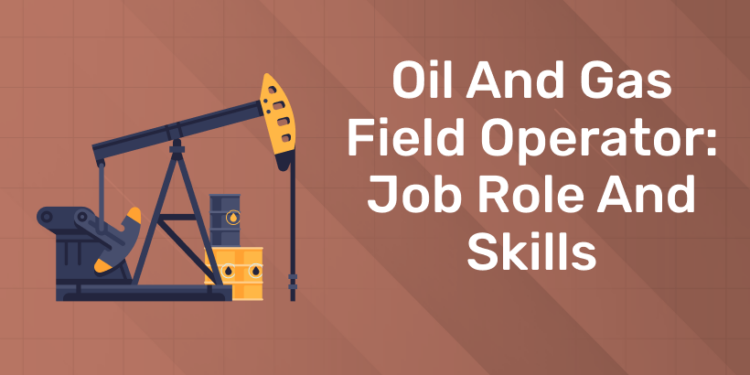Table of Contents
Oil and Gas field operator plays an important role in the energy sector, ensuring the continuous movement of oil or natural gas production from the wellhead “downstream”, i.e., to the oil battery, gas plant or processing facility. The oil and gas Industry is one of the largest industrial sectors in the world. This industry has a great impact on the economy of a country and hence there is a high demand for workers in this field. Let us have a detailed look at the role and skills of oil and gas field operator.
Get Certified! Get Confident! Join our Oil and Gas Course!
Job Role of Oil and Gas Field Operator
Field operators move from well to well and are responsible for optimizing production of the gas or oil wells that are on their “field run”. They focus on the efficient extraction of oil and natural gas from underground reserves. Their duties are based on various factors like the size of the field, whether it produces oil or gas (as well as natural gas liquids, or a mix), and the types of equipment required. Let us have a look the various jobs they perform:
- Start and stop equipment, take pressure and flow readings, compute and record data, adjust valves/pressures, and examine and repair equipment.
- Operate equipment to increase oil flow from producing wells or to remove stuck pipe, casing, tools, or other obstructions from drilling wells.
- Manage oil batteries, dehydrators within their field run.
- Perform daily inspections
- Maintenance tasks such as fixing pumps, changing compressor valves, packing repairs, and replacing sight glasses.
- Perform safety inspections on equipment and tools.
- Work with other operators and instrument technicians to troubleshoot and resolves issues.
- Develop an understanding of well site and facility processes and how equipment and control systems should be communicating within the plant or field
- Listen to engines, rotary chains, or other equipment to detect faulty operations or unusual well conditions.
- Manage the injection of water, chemicals, or gases into wells to enhance oil recovery or dispose of waste products in an environmentally responsible manner.
- Oversee the installation, dismantling, and transportation of oil field machinery and equipment
- Operate controls that raise derricks or level rigs.
- Monitor production equipment, gauges, and meters to detect any malfunctions, leaks, or deviations from normal operations and initiate corrective actions when necessary.
- Record daily operations data, including production volumes, operational hours, and any incidents, maintaining accurate logs for compliance and analysis.
- Work closely with engineers and other professionals to ensure that extraction processes are optimized, adhering to environmental regulations and standards.
How to Become an Oil and Gas Field Operator?
1: What is the primary purpose of a refinery in the oil and gas industry?
The role of a field operator is quite demanding and strenuous. You need to stick to a strict operating schedule, even during high-stress situations. Field operators usually work days, but evening call-outs can occur if maintenance or production issues arise at a well site the operator covers. A field operator often works under the direct supervision of a field manager. You can start gaining experience and developing skills by working as a roustabout or pumper. While working in an entry-level position, you must learn to make repairs, read instrumentation, and document operations. Let us have a look at the educational and industrial requirements for this post.
Educational Qualification Required for Oil and Gas Field Operator
Industry Experience Required for Oil and Gas Field Operator
Companies prefer individuals who have some experience working with heavy machinery. Although oil field experience is a bonus, oil extraction companies often recruit freshers and provide on-site training to qualified applicants. They are trained on the job and take first aid and safety training courses. New operators usually work under more experienced operators for a time, then start working independently.
Some of the soft skills required are:
- leadership skills
- teamwork capabilities
- communication skills
- good judgment in high-pressure situations
- ability to work onsite for extended periods
- physical stamina
- creative thinking abilities
- problem solving skills
- attention to detail
A wide range of technical and non-technical skills are required for working in the oil and gas sector. Being passionate about your job is one of the biggest steps towards building a successful career. Having a deep understanding of the oil and gas industry will help you build skills required to succeed in this sector.
Join Our Oil and Gas Course! Get Placement Assistance!
|
Engineering Upskilling Courses
|
| MEP Course |
Frequently Asked Questions
Who is a Field Operator in oil and gas sector?
Field operator is the one who ensures continuous movement of oil or natural gas production from the wellhead “downstream” to the oil battery, gas plant or processing facility.
What are the soft skills required by field operators?
Some of the soft skills required by field operators are:
- leadership skills
- teamwork capabilities
- communication skills
- good judgment in high-pressure situations
- ability to work onsite for extended periods
- physical stamina
- creative thinking abilities
- problem solving skills
- attention to detail
What is the educational qualification required by field operators?
Field operators should have a high school diploma and some mechanical aptitude.









